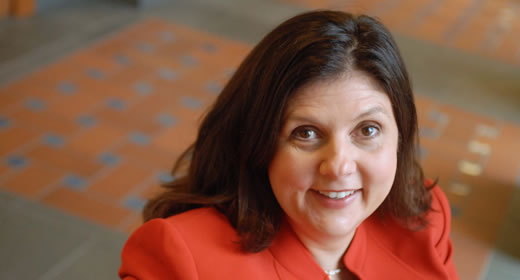
Betsey Stevenson is helping to paint a picture of the stark reality surrounding racial and economic inequality in the United States.
In a July 30 Yahoo Politics article, "Obama: Investing in minority men is not 'charity,' it's lucrative," Senior National Affairs Reporter Liz Goodwin examined how the Obama administration has utilized strategic messaging to advance My Brother's Keeper, one of President Obama's signature initiatives, designed "to help minority boys and young men succeed at school and in the workforce." The piece, of course, was published shortly after Stevenson and fellow members of the White House Council of Economic Advisers released a report, Economic Costs of Youth Disadvantage and High-Return Opportunities for Change. That report highlighted the potential economic benefit the U.S. could enjoy and sustain if the nation were to close the "persistent gaps in opportunity that prevent them from reaching their potential and contributing fully to their communities and the economy."
Calling out one particularly illustrative statistic, Stevenson told Yahoo Politics that "for every [minority man] who was born 25 years ago, only half of them are employed today." “That means there are half of them we have lost — that’s a lot of talent we are losing. When you think about it that way, it becomes obvious the toll it’s taken on our nation.” And, for now, it appears that the economic argument may be more persuasive to policymakers than would a social imperative, according to Goodwin.
Stevenson has also been in the news recently defending the White House's position on wages. While Democrats and Republicans alike have engaged in a public debate over the merits of a nation-wide increase to the minimum wage, many of President Obama's fellow Democrats have continued to revise their figures upward. In a July 28 article in The Hill, Mike Lillis suggests that this has put pressure on the White House to follow suit while also placing the President at the center of criticism for appearing to have changed his stance. Addressing that perception in a conference call with reporters, Stevenson said, "The White House has been pretty clear that we support raising the minimum wage for the nation... We haven't changed our position on that."
In other economic matters, Stevenson and her White House colleague Jeff Zients, the director of the National Economic Council and assistant to the President for Economic Policy, have also taken aim at job licensing requirements. Their whitehouse.gov blog post, "Trends in Occupational Licensing and Best Practices for Smart Labor Market Regulation," was cited by a number of news outlets including Reuters and the Wall Street Journal.
Currently, states implement a bevy of different licensure requirements for certain occupations such as hair stylists, doctors, and construction workers. The variation in these criteria from state to state, according to their post and reported in a July 28 story from Reuters, creates additional barriers for workers seeking to go where the jobs are. In addition to particular burdens on military families and immigrants, Stevenson added, "restrictions that keep people with criminal records from obtaining certain licenses should also be evaluated."
Nick Timiraos, a national economics reporter for the Wall Street Journal Real Time Economics, also dove into the licensing question on his July 30 article, "White House Warns States On Job-Licensing Requirements." Addressing the difficulty of reforming these regulations or removing certain licensing requirements altogether, Stevenson said, "it's basic political science to understand why it can be really difficult because once you have people licensed, you can identify who is the protected group of people and they obviously benefit when people are kept out of their profession." "It's harder to identify who is hurt," she added.
Nearing the end of her appointment with the Council of Economic Advisers, Stevenson will return to active status at the Ford School this fall, teaching two courses: "Topics: Social Policy Making Through the Executive Branch" and "Topics: Federal Budget Process."
Betsey Stevenson is an associate professor of public policy at the Gerald R. Ford School of Public Policy. She is also a research associate with the National Bureau of Economic Research, a fellow of the Ifo Institute for Economic Research in Munich, and serves on the board of directors of the American Law and Economics Association. She served as the chief economist of the U.S. Department of Labor from 2010 to 2011. Stevenson is a labor economist whose research focuses on the impact of public policies on the labor market. Her research explores women’s labor market experiences, the economic forces shaping the modern family, and the potential value of subjective wellbeing data for public policy.